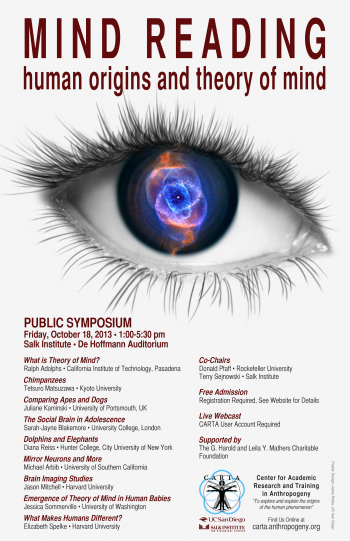Mind Reading: Human Origins and Theory of Mind
Donald Pfaff, Rockefeller University
Terry Sejnowski, Salk Institute for Biological Studies
The phrase "Theory of Mind" (ToM) has historically referred to the ability to impute mental states to oneself and others, but has been used in a variety of ways during the 35 years since the original Premack and Woodruff paper (1978). [PDF file available below for download.] The analysis of ToM has been the subject of many papers in developmental psychology and in anthropogeny, the latter focusing on differences in mental performance between humans versus other mammals and birds. Because precise definition is necessary for rigorous scientific analysis, the first talk will focus on what ToM is. The rest of the talks will cover the Ontogeny of Human ToM, relevant information on other mammals and birds, and the neuronal correlates and mechanisms of human ToM performance.
Media for each talk can be played by clicking on icons in the table below, or by clicking on the individual talk titles below and then the attachment file at the bottom of the page.
| Speakers | Media | Session |
|---|---|---|
 Ajit Varki |
|
Welcome |
 Donald Pfaff |
|
Opening Remarks |
 Ralph Adolphs |
|
What is Theory of Mind? The term “Theory of Mind” has been used interchangeably with a number of related concepts (mentalizing, mirroring, mindreading, to name a few), operationalized in a variety of ways (such as the ability to attribute false beliefs), and investigated at multiple levels (philosophical, psychological, and neurobiological). This feature, together with the explosion of research on the topic, have resulted in a rather fuzzy picture regarding how best to define Theory of Mind, how to relate it to the... read more |
 Tetsuro Matsuzawa |
|
"Mind Reading" in Chimpanzees For many years, I have studied chimpanzees both in the laboratory and in the wild. The “Ai project” is a long-running laboratory study at the Primate Research Institute of Kyoto University, Japan. Findings have revealed that young chimpanzees have an extraordinary photographic memory; chimpanzees can memorize, at a glance, numerals displayed on a computer monitor. This is a cognitive task at which young chimpanzees do better than adult humans. Laboratory research has demonstrated various social... read more |
 Juliane Kaminski |
|
Comparing Apes and Dogs Humans are social creatures maintaining shared complex systems of communication, skills and knowledge. Human sociality appears to be unique throughout the animal kingdom in its complexity as well as its impact on the lifestyle and environment of the species. One key feature of human social interactions is that humans have the ability in some situations to make inferences about other individuals’ mental states (e.g., others’ knowledge, beliefs and desires). One goal in comparative psychology is... read more |
 Sarah-Jayne Blakemore |
|
The Social Brain in Adolescence The brain has evolved to understand and interact with other people. This talk focuses on how the social brain, that is the network of brain regions involved in understanding others, develops during adolescence. Adolescence is a time characterised by change - hormonally, physically, psychologically and socially. Yet until fairly recently, this period of life was neglected by neuroscience. In the past decade, research has shown that the brain develops both structurally and functionally during... read more |
 Diana Reiss |
|
Reflections of Dolphin and Elephant Minds The ability to recognize oneself in a mirror, once considered a uniquely human attribute, is shared by great apes, dolphins, elephants and magpies. In our comparative studies of mirror self-recognition in dolphins and elephants, they showed striking similarities to humans and great apes in the stages of behavior that emerged and the specific types of behaviors they exhibited when exposed to a mirror. These findings provide a case for cognitive convergence in highly encephalized but... read more |
 Michael Arbib |
|
Mirror Neurons and More Mirror neurons were first discovered in the brain of macaque monkeys -- neurons active both when the monkey executed certain actions and when he observed others performing similar actions. Perhaps such neurons in humans could provide the key to linking our own experience to that of others. Postulating that mirror neurons existed in the last common ancestor of humans and macaques, we trace a path via facial expression and the learning of manual gestures by apes to human “theory of mind.” But,... read more |
 Jason Mitchell |
|
Brain Imaging Studies Although we never directly perceive the mental states of others, humans are nevertheless proficient mind readers⎯we are rarely stumped by what other people are thinking or feeling. How, then, do we make sense of the goings-on inside another person’s mind? Over the past two decades, a surprising answer has been suggested by research investigating the neural basis of such social abilities: the human brain appears to have dedicated systems for understanding other minds. This talk will review this... read more |
 Jessica Sommerville |
|
Emergence of Theory of Mind in Human Babies Theory of mind, the ability to predict, describe and explain one’s own and others’ behavior with reference to mental states, plays a central role in human social cognition and behavior. Classic research suggests critical developments in children’s explicit theory of mind in the preschool years. Yet well before this time infants and young children possess sophisticated knowledge that guides their understanding of the social world. In this talk I review evidence to suggest that, within the first... read more |
 Elizabeth Spelke |
|
What Makes Humans Different? Mature human cognition is complex and variable, both across contemporary cultures and over human history, but human cognitive development proceeds in a predictable and regular pattern in infants and young children. Here I ask whether studies of human infants provide insights into the origins and nature of uniquely human social cognitive capacities. Do the complex social judgments made by human adults develop from, and build on, simpler systems that are functional in infants? Do non-human... read more |
 Terry Sejnowski |
|
Wrap-up |
 All Speakers |
|
Question and Answer Session |
| Attachment | Size |
|---|---|
| 1.4 MB | |
| 1.31 MB | |
| 2.94 MB | |
| 794.17 KB | |
| 150.58 KB |
If you enjoy this event, please consider supporting CARTA's quest to explore and explain the human phenomenon.


